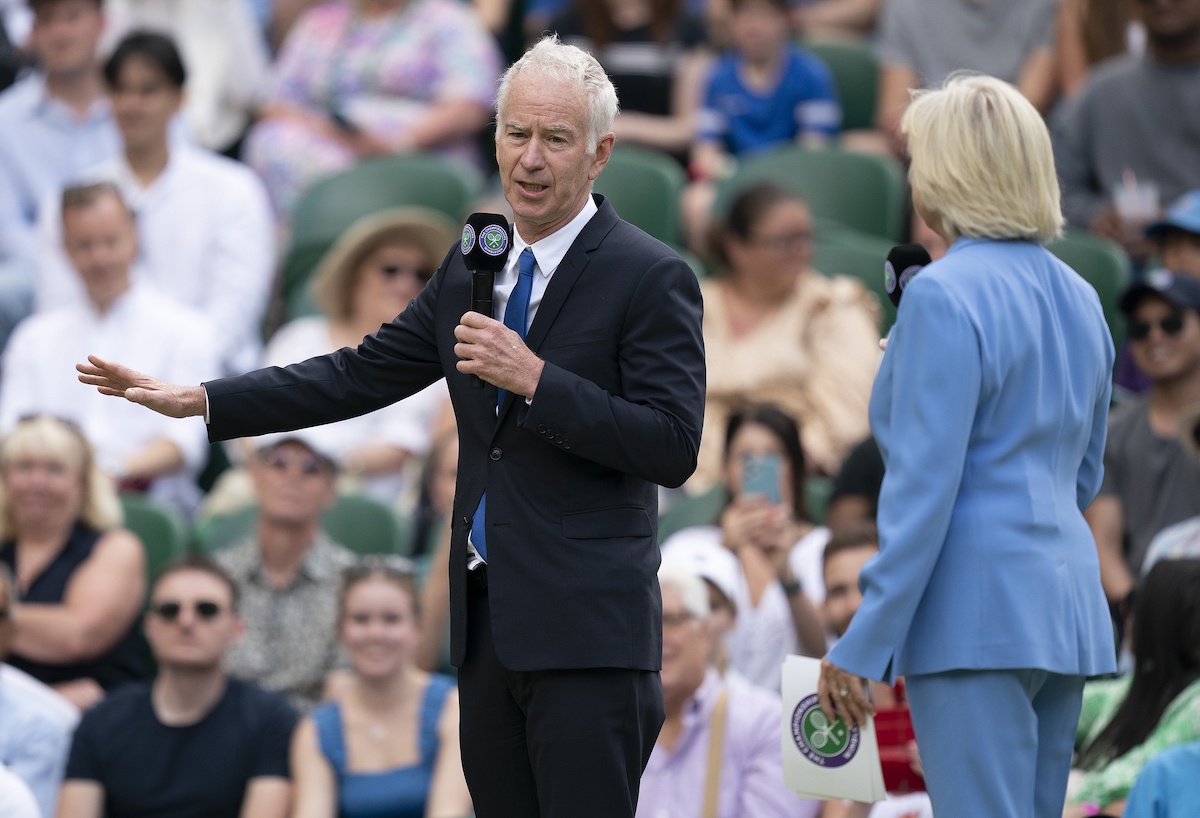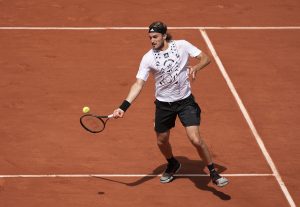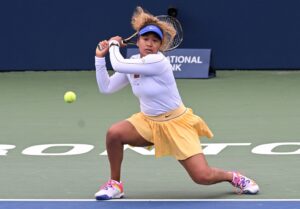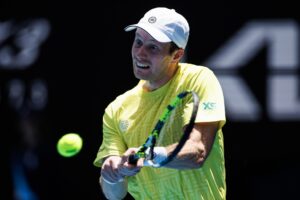Unfortunately, contrary to all the rumours and reports earlier this year, Roger Federer will not be returning to Wimbledon to commentate for the BBC or anyone else, at least for the immediate future. The great Swiss, still stylistically the GOAT even if both Novak Djokovic and Rafael Nadal have overtaken him statistically in terms of total Majors won, will not be using any one of his many languages to impart tennis wisdom to television audiences.
Fortunately, there are other tennis players – some nearly as great as Federer, others not so much – who have successfully made the transition from the court to the commentary box. And in some cases, they have proved themselves to be even better at talking about tennis than playing it.
Here then are the five finest tennis players turned commentators, all of whom have hugely illuminated even the most knowledgeable of tennis fans.
- Mark Petchey
Perhaps it is because he was a coach, including to a young Andy Murray, that “Petch” is probably the most technically precise of all tennis commentators. While others might talk loftily about Rafael Nadal’s extraordinary defence, he will find exactly the right statistics to prove that Rafa is actually an extraordinary attacking player as well. And he will invariably identify any weaknesses, or at least areas for improvement, in any player’s game.
What is perhaps most pleasing about Petchey’s success as a tennis commentator is that it has finally allowed him to express all of his knowledge and love of tennis. As a player, his highest ranking was No.80 and since he retired he has even openly talked at times, notably while commentating for ITV Sport at the French Open, about suffering from “imposter syndrome” as a player, meaning that he never really felt that he was good enough to succeed as a professional tennis player. But there is no doubting his ability as a commentator. He may once have struggled to find the right shots, but he seldom if ever struggles to find the right words.
Embed from Getty Images
- Martina Navratilova
Navratilova is arguably the greatest female tennis player of all time, or at least in the top two alongside Serena Williams, and she has similarly excelled in the commentary box. Despite English not being her first language (albeit that she has spoken it for most of her life), she is superbly and stridently skilful and even, when necessary, outspoken in her use of it. One of her finest moments came for Amazon Prime at the US Open in 2021, when Emma Raducanu stunned the world by going from qualifying to winning the tournament. Navratilova not only declared that “The Next Gen is The Now Gen”, but even showed her supreme pop-culture savvy by declaring that, contrary to what Gil Scott-Heron (aka The Godfather of Hip-Hop) had predicted, “The revolution will be televised”.
It is essential to add that in addition to her television commentary Navratilova has been a tennis commentator in the wider sense of the term, using her fame and platform to campaign for the issues that are most important and indeed most personal to her. Having effectively been “outed” herself as a gay woman in the early 1980s, when she was already coping with the difficulty of having defected from the former Czechoslovakia to the US (leaving her entire family behind in the process), she has since become one of the staunchest defenders of LGBTQ+ rights, both within tennis and beyond. For example, she has publicly (and rightly) denounced the viciously homophobic Margaret Court, praising her tennis achievements but damning her personal failings. And if the similarly homophobic Saudi Arabia should ever try to buy tennis as it has seemingly just bought golf, we can be sure that Martina would lead the fight against it.
Embed from Getty Images
- Robbie Koenig
There is a strong argument that Robbie Koenig should be No.1 on this list, because when it comes to week-by-week commentary on both the ATP and WTA tours, or even just match-by-match commentary, he is undoubtedly the most memorable (and quotable) tennis commentator. Indeed, at times it seems as if he is the reincarnation of the late, great Nick Bollettieri, because of his utterly undiluted adoration of tennis. However, whereas Bollettieri largely contented himself with his trademark exclamations, such as “Holy mackerel” or the like, Robbie has a far more varied vocabulary.
Regular viewers of Amazon Prime, where Koenig usually plies his commentating trade, will already be familiar with some of his finest verbal inventions, such as “Daylight lobbery” to describe a lob played under pressure that somehow wins a point. However, as with Roger Federer and now Carlos Alcaraz on the court, the real joy of watching (or rather listening) to Robbie is that he is always capable of producing the miraculous, even in a seemingly mundane setting or match.
Only this week at Queen’s, he produced two fabulous phrases when commentating on the match between Lorenzo Musetti and Ben Shelton. First, he coined the term (at least it’s new to me), “Serve, survey and volley”, to describe how Shelton had produced a big first serve, then waited to see how his opponent responded before coming to the net. Then, even more beautifully, he described Musetti as “Lorenzo Baryshnikov”, perfectly describing the balletic footwork that accompanied one especially sumptuous one-handed backhand down the line.
Koenig was a relative journeyman as a player; as a doubles specialist, his career highlight was reaching the 1998 US Open Men’s Doubles semi-final with the unforgettably named John-Laffnie de Jager, whose marvellous monicker might just have stimulated his lexical love. But as a commentator he is a major player.
Embed from Getty Images
- Andy Roddick
Such has been the almost complete domination of men’s tennis in the last 20 years by The Big Three of Djokovic, Nadal and Federer that even their most gifted contemporaries struggled to win a single Major. That was certainly true of both Juan-Carlos Ferrero and Andy Roddick, who, before Federer had fully emerged (let alone Nadal and Djokovic), had won Major Singles titles and ascended to World No.1, only to then find their chances of further Major success stymied, first by Federer and then by Federer, Nadal and Djokovic.
Fortunately for both these fine players, they have more than compensated for any feeling of frustration about their playing career. Ferrero, of course, has become coach, mentor and tennis father figure to Carlos Alcaraz, who may well end up winning all the Major singles titles that Ferrero himself was denied. And Roddick has become one of the truly great voices of tennis, both on and off the court.
Roddick first displayed his linguistic ability as a player, notably in 2009, when he lost to Federer for a third time in a Wimbledon Final (which gave Federer a 15th Major title and took him past Pete Sampras’s record of 14 Majors). He memorably said afterwards that although he had “thrown the kitchen sink” at Federer, Federer had “thrown a bath-tub back”. Consequently, he easily transitioned into a media career and has excelled while commentating on both sides of the Atlantic, for the BBC at Wimbledon (when he talked about how, as a child, he had grown up watching “Breakfast at Wimbledon”) and for US networks.
Roddick has even proved himself prophetic as a commentator, most recently just a fortnight ago during the French Open semi-final. As the BBC radio commentators related afterwards with some awe, Roddick foresaw Carlos Alcaraz’s extreme cramping problems before anyone else (Alcaraz himself included), announcing on Twitter a few moments before they became apparent that it was obvious to him that the young Spaniard was about to go into spasm. And so the legend and mystique of “Andy Nostradamus Roddick” was only reinforced.
Embed from Getty Images
1. John McEnroe
And so to the top one, who may just be the reason that Federer has hesitated before going into the commentary box, because John McEnroe has set an almost impossibly high standard for tennis players turned commentators. A truly great player himself (he is arguably the best and certainly the most inventive serve-volleyer the sport has ever seen), he has proved himself to be an even greater commentator. And that’s not just a unique achievement in tennis but in sport in general, because it’s not as if Pelé or Muhammad Ali (McEnroe’s peers in terms of sporting greatness) ever talked about their sport as well as they performed within it.
What is most pleasing about McEnroe’s ascent to the top of tennis commentary – like Roddick, both for the BBC and for US networks – is that he finally seems to have gained the joy as a commentator that he never really experienced as a player. Quite simply, the older McEnroe is the infinitely mellower McEnroe, as he himself admits, often saying that he had obviously unresolved “anger issues” as a player.
Anyone who has ever seen the magnificent McEnroe documentary (or “Mac-Doc”), John McEnroe: In The Realm of Perfection (2018) (https://lastwordonsports.com/tennis/2019/05/31/with-mcenroe-in-the-realm-of-perfection-and-petulance/), will know whereof I write. The film itself is extraordinary, the non-fiction equivalent of Borg vs McEnroe (2017), which is arguably the greatest (and certainly the most artistic) film about sport, not just tennis, ever made. It focuses on his legendary 1984 French Open campaign, when he played superb serve-volley tennis, on clay, to reach the final, only to lose from two sets up to Ivan Lendl.
In The Realm of Perfection shows a sportsperson absolutely at the top of their game, but seemingly unable to enjoy it because of the demons within and the pressures (including from the media) without. By contrast, as a tennis commentator rather than as a tennis player, McEnroe inhabits the same realm of perfection but without all the accompanying petulance and even self-laceration. Having been one of the very greatest tennis players, he is now unquestionably the greatest tennis commentator, and that may just be why even Roger Federer is hesitating before attempting to follow him.






